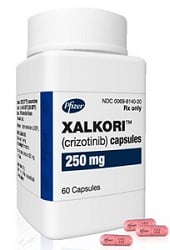 Pfizer's ($PFE) Xalkori was already approved to treat metastatic non-small cell lung cancer patients with ALK-positive tumors. But now, the company has a new selling point for the med.
Pfizer's ($PFE) Xalkori was already approved to treat metastatic non-small cell lung cancer patients with ALK-positive tumors. But now, the company has a new selling point for the med.
Friday, the FDA green-lighted the drug for NSCLC sufferers with ROS1-positive forms of the disease after granting it a priority review back in December. It's the first biomarker therapy to snag a go-ahead in the ROS1 population, and though that's a tiny one--affecting about 1% of all NSCLC patients, according to Pfizer--it's one where patients see a long duration of therapy, Pfizer CEO Ian Read said on the company's Q3 earnings call.
Pfizer's strategy with Xalkori has been to pinpoint distinct molecular targets for the drug, and so far, it's working. The product is the only one that can now boast two of those, a fact Pfizer says highlights its "commitment to precision drug development and to identifying the right treatment for the right patient."
And because Xalkori is used in small patient subsets that lack other options, Pfizer can get away with a high price tag. The med raked in $488 million last year thanks to its $14,336-per-month list price, and analysts have said they expect it to join the blockbuster ranks by 2020.
Meanwhile, though, countries with hard-to-get-past cost watchdogs haven't let Xalkori go unchecked. Both the U.K.'s National Institute for Health and Care Excellence (NICE) and Germany's Institute for Quality and Efficiency in Health Care (IQWiG) shot the drug down in 2013.
And it may not be too much longer until Pfizer has to deal with some competition. Novartis ($NVS) is currently trialing its Zykadia as a first-line treatment for patients with ALK-positive NSCLC, and if it nabs that label expansion, it'll go head-to-head with the pharma giant.
- read Pfizer's release
Special Report: Top 10 best-selling cancer drugs of 2013